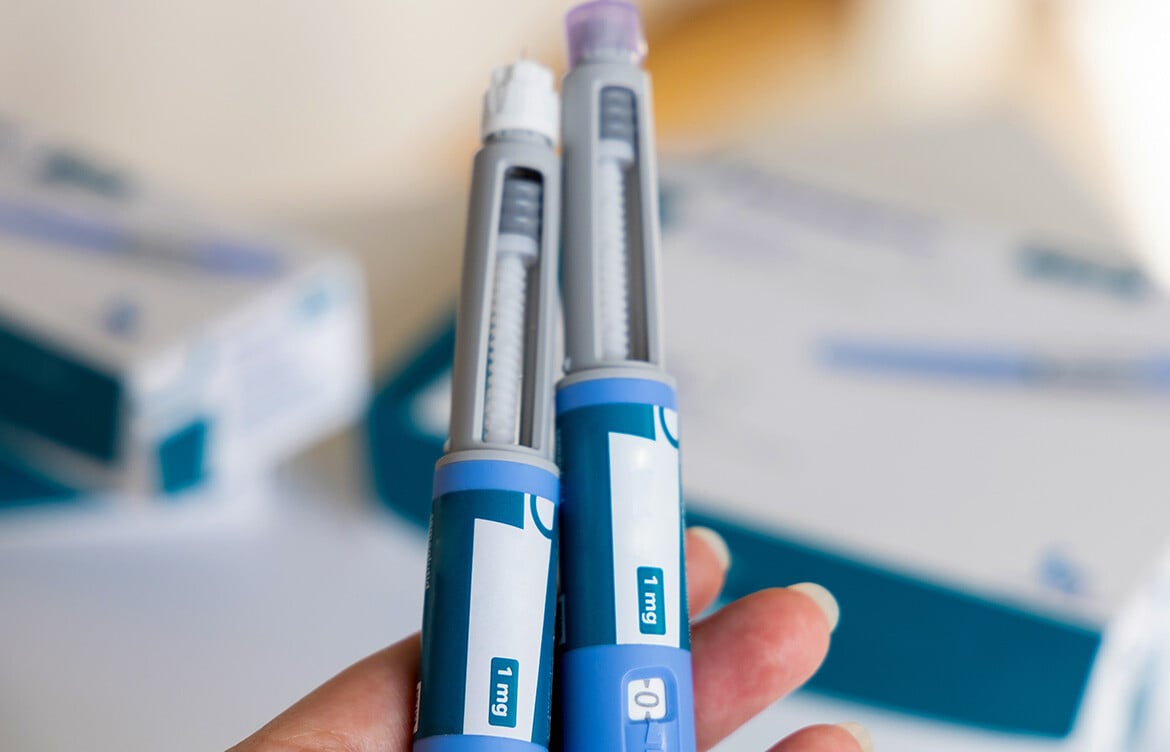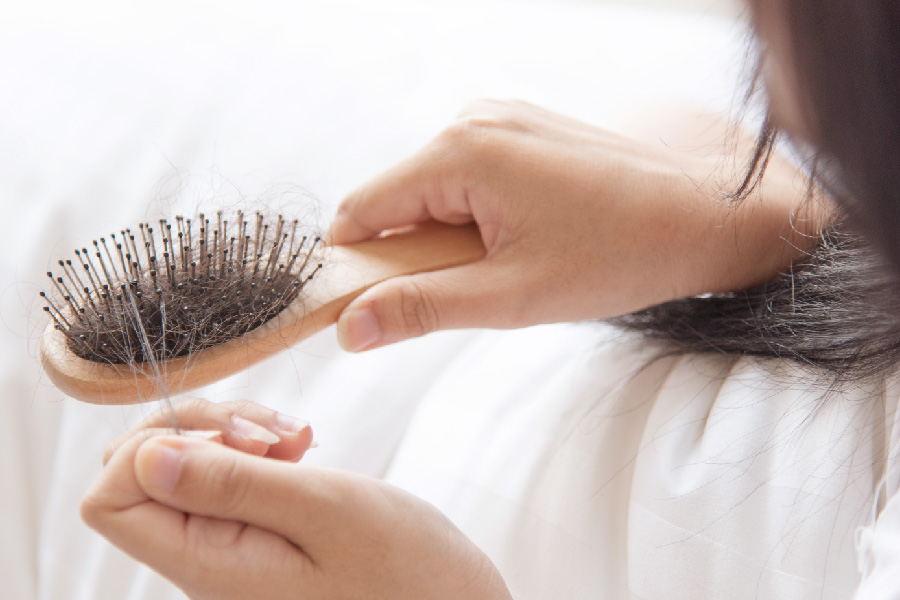Does Ozempic Cause Hair Loss?

Ozempic, along with related weight-loss medications like Wegovy and Mounjaro, has gained significant attention as a groundbreaking option for managing Type 2 diabetes and aiding in weight loss. Its effectiveness in helping individuals control blood sugar levels and shed pounds has made it a popular choice for both its approved use and off-label weight management. However, as with any medication, questions and concerns about potential side effects arise - and one of the more surprising concerns circulating is whether Ozempic can cause hair loss.
As of December 2024, approximately 15 million U.S. adults are using GLP-1 receptor agonist medications - such as Ozempic, Wegovy, and Mounjaro - for weight loss and diabetes management. According to these numbers, if you're worried about hair thinning or shedding while using weight loss medication, you're not alone.
While clinical studies on Ozempic don't list hair loss as a direct side effect, anecdotal reports raise questions about its potential link. Could it be the medication itself, or might it be related to factors like rapid weight loss or lifestyle changes that often accompany its use?
In this article, we’ll dive into the research behind Ozempic and similar medications, explore possible reasons for hair loss during treatment, and introduce you to the right product to help prevent excessive hair shedding, so you can feel confident in your haircare routine.
What Is Ozempic and How Does It Work?
What exactly is Ozempic? At its core, it’s a medication containing a drug called semaglutide, which is part of a class of treatments known as GLP-1 receptor agonists. These medications work by mimicking a hormone in your body called GLP-1 (glucagon-like peptide-1). GLP-1 plays a role in regulating blood sugar levels, slowing down digestion, and reducing appetite—all of which can help people manage diabetes and lose weight more effectively.
For those using it off-label or under medical supervision for weight loss, Ozempic can reduce hunger and help control overeating, making it easier to stick to a healthier lifestyle.
Its counterparts, Wegovy (another form of semaglutide) and Mounjaro (a medication containing tirzepatide), offer similar benefits. Wegovy is specifically approved for weight loss, while Mounjaro is designed to treat diabetes but is also gaining attention for its impressive weight-loss effects.
These medications have gained a lot of attention because they provide significant results. People taking drugs like Ozempic, Wegovy, or Mounjaro often report losing a meaningful amount of weight, improving their overall health, and gaining better control over their blood sugar levels.
Can Ozempic Cause Hair Loss? What the Research Says

It's important to know that hair loss is not listed as a known side effect of Ozempic, Wegovy, or Mounjaro in clinical trials or FDA-approved documentation. When you look at the list of side effects in the prescribing information for these medications, you’ll see common issues like nausea, vomiting, diarrhea, and constipation. But hair loss? It’s not mentioned.
That being said, some people have shared their personal experiences online, reporting hair shedding when using these medications. While there isn’t scientific evidence directly linking these medications to hair loss, it’s worth understanding why this might be happening - and why it’s likely not caused by the medication itself.
For many people using Ozempic, Wegovy, or Mounjaro, hair loss may be less about the medication and more about the process of losing weight itself. Hair shedding, or telogen effluvium, is a common response to significant or rapid weight loss. Here’s why:
Stress on the Body
When your body undergoes a major change, like sudden weight loss, it can experience physical stress. This stress may temporarily push hair follicles into the shedding phase of their growth cycle, leading to noticeable hair loss.
Nutritional Changes
Weight loss often involves changes in diet or calorie intake. If your body isn’t getting enough key nutrients - such as iron, zinc, or protein - this can affect your hair health. Hair requires proper nutrition to stay strong and grow, so deficiencies during weight loss can result in increased shedding.
Hormonal Shifts
Weight loss can also impact hormone levels, which play a big role in hair growth. Hormonal fluctuations during weight loss may temporarily disrupt your hair cycle, contributing to hair shedding.
What You Can Do to Address Hair Shedding

If you’ve noticed more hair shedding than usual while on weight loss medications - or during your weight-loss journey in general - don’t worry. Hair shedding is often temporary, and there are steps you can take to protect your hair and support healthy regrowth.
Eat a Balanced Diet
Your hair needs key nutrients to stay strong and grow. Make sure you’re eating foods rich in protein, iron, and zinc.. Incorporate foods like lean meats, fish, eggs, nuts, beans, and leafy greens into your meals to keep your hair healthy.
Manage Stress
Stress can take a toll on your body, including your hair. Try mindfulness practices like meditation, yoga, or even a daily walk to help lower stress levels. Therapy or talking with a trusted friend can also help manage emotional challenges.
Be Gentle on Your Hair
Avoid harsh hair treatments like bleaching, tight hairstyles, or excessive heat styling. These can weaken your hair and make shedding worse. Use a gentle shampoo and conditioner to minimize damage.
For Instant Results Use Intact 5
When it comes to addressing hair shedding, dietary changes and stress management are essential, but they can take months to show visible results. For people seeking a faster solution, Intact 5 is the breakthrough you’ve been waiting for. Designed as a pre-shampoo scalp treatment, Intact 5 works in just 5 minutes.
What sets Intact 5 apart is its robust scientific backing. It has been tested in a third-party, double-blind clinical study, where over 91% of users experienced a significant reduction in hair shedding after just one use.

Using Intact 5 is simple and fits effortlessly into your existing routine. Before washing your hair, apply the treatment to your scalp and let it sit for 5 minutes. Then, rinse it out during your regular shampoo session. The treatment strengthens hair follicles at the root and minimizes hair loss caused by brushing, washing, or styling.
Take Control of Hair Shedding During Weight Loss
While Ozempic and similar medications like Wegovy and Mounjaro are not directly linked to hair loss according to clinical studies, shedding can sometimes occur as an indirect result of rapid weight loss or lifestyle changes. The good news is that hair shedding is typically temporary and can be managed with the right care and strategies.
By focusing on a balanced diet, managing stress, and being gentle with your hair, you can support healthy regrowth over time. For anyone seeking quicker, more immediate results, Intact 5 offers an innovative, clinically proven solution to reduce excessive hair shedding in just 5 minutes. With its ability to strengthen hair follicles at the root, Intact 5 provides the confidence you need to tackle hair shedding head-on.
If you’re noticing hair loss during your weight-loss journey, remember there are effective ways to address it. Work closely with your healthcare provider to ensure your overall health is supported, and consider adding Intact 5 to your routine for rapid, reliable results.

.jpeg)
